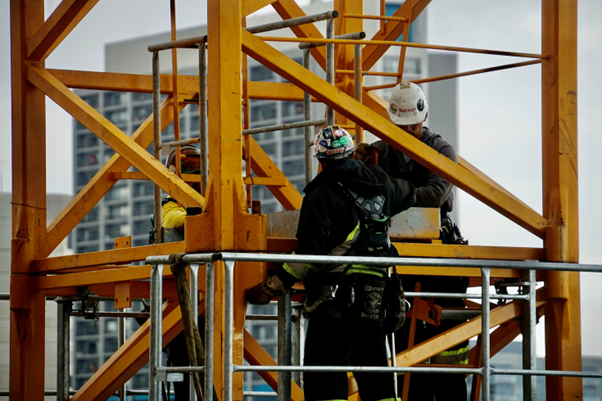The construction industry is undergoing a significant transformation due to advancements in technology. From improving safety and efficiency to enhancing collaboration and sustainability, technology trends are revolutionizing how construction projects are planned, executed, and managed. In this blog post, we will explore the top technology trends that are reshaping the construction industry and their impact on construction processes, productivity, and overall project outcomes.
Building Information Modeling (BIM)
Building Information Modeling (BIM) is a game-changer in the construction industry. BIM allows for the creation of digital representations of buildings, integrating all relevant information, including architectural designs, structural analysis, material specifications, and project schedules. By visualizing the project in a 3D environment, stakeholders can collaborate effectively, identify potential clashes, and optimize designs before construction begins. BIM enhances project coordination, reduces rework, and improves productivity. Additionally, it enables efficient facility management by providing a digital model that contains essential information for maintenance and repairs.
Drones and Aerial Imaging
Drones equipped with high-resolution cameras and sensors are revolutionizing construction site surveys and inspections. They can quickly and safely capture aerial images, videos, and data, providing valuable insights into site conditions, progress monitoring, and inventory management. Drones enable accurate topographic mapping, volumetric calculations, and identifying potential safety hazards. By reducing the need for manual surveys, drones save time, improve accuracy, and enhance worker safety. Aerial imaging also aids in project documentation and client communication by providing visual representations of the construction site from various angles.
Internet of Things (IoT) and Smart Sensors
The Internet of Things (IoT) and smart sensors are transforming construction sites into intelligent environments. IoT devices and sensors embedded in equipment, machinery, and building components can collect real-time data on performance, condition, and energy usage. This data allows for predictive maintenance, optimizing resource allocation, and monitoring safety parameters. Smart wearables equipped with biometric sensors can enhance worker safety by monitoring vital signs and detecting potential health risks. IoT technology also enables remote monitoring and control of construction sites, improving project management and reducing costs.
Augmented Reality (AR) and Virtual Reality (VR)
Augmented Reality (AR) and Virtual Reality (VR) technologies are enhancing design visualization, training, and project communication in the construction industry. AR overlays digital information onto the real-world environment, allowing stakeholders to visualize designs, make real-time adjustments, and identify potential issues on-site. VR, on the other hand, creates immersive virtual environments that enable virtual walkthroughs, training simulations, and client presentations. These technologies improve collaboration, facilitate informed decision-making, and minimize errors by providing a realistic preview of the final construction.
Robotics and Automation
Robotics and automation are streamlining construction processes, particularly in tasks that are repetitive, labor-intensive, or hazardous. Robots can perform tasks such as bricklaying, 3D printing of structures, and material handling with precision and efficiency. Automation systems for construction equipment, such as autonomous vehicles and machinery, improve safety and productivity by reducing human error and fatigue. By delegating repetitive tasks to robots and automated systems, construction companies can allocate their workforce to more complex and strategic activities, ultimately increasing productivity and project timelines.
Sustainable Construction Practices
Sustainability has become a top priority in the construction industry, and technology plays a crucial role in achieving eco-friendly practices. Energy-efficient building materials, renewable energy solutions, and smart building systems are being integrated into construction projects to reduce environmental impact. Advanced sensors and monitoring systems enable real-time energy management, optimizing energy usage and reducing waste. Additionally, the adoption of green building certifications, such as LEED (Leadership in Energy and Environmental Design), is becoming increasingly common. These certifications promote sustainable construction practices by setting standards for energy efficiency, water conservation, indoor air quality, and materials selection. Technology facilitates the implementation and monitoring of these sustainable practices, ensuring that construction projects are not only efficient and cost-effective but also environmentally responsible.
Construction Time Tracking Software
Construction time tracking software is a valuable tool that revolutionizes project management and improves efficiency in the construction industry. The software at SmartBarrel.io enables accurate and automated tracking of employee hours, equipment usage, and project progress. By replacing manual timesheets and cumbersome paperwork, construction time-tracking software simplifies payroll processes, eliminates errors, and ensures compliance with labor regulations. It provides real-time insights into labor costs, productivity, and resource allocation, allowing project managers to make data-driven decisions and optimize project timelines. With features like mobile compatibility and GPS tracking, this software offers seamless and convenient time-tracking solutions for construction teams.
The construction industry is undergoing a significant technological revolution. Building Information Modeling (BIM), drones, IoT, AR/VR, robotics, and sustainable practices are transforming construction processes and project outcomes. These trends enhance collaboration, safety, efficiency, and sustainability. By embracing these advancements, construction companies can streamline operations, optimize resource allocation, reduce costs, and achieve successful project delivery in the ever-evolving construction landscape. It is essential for industry professionals to stay abreast of these technology trends and harness their potential to drive innovation and growth in the construction industry.


